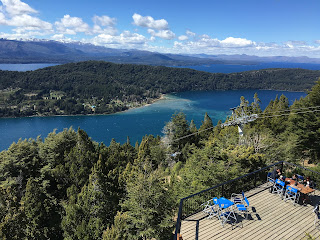On a cold windy evening, the sound of the waves hitting the shore makes me forget that this is not a sea I am hearing from. The Lake Region which comprises of land from both Argentina and Chile is the start of the wonder called Patagonia. When in Patagonia, if its not windy, the locals feel out of home.
 |
| Lake Nahuel Huapi from my room in Bariloche |
The morning starts all sunny with still views of the Nahuel Huappi Lake. The local guide very confidently exclaims “look at the lake now and then we will see it again on our way back”. As I sit by the view of my lake facing room, with the window just aptly open to let the sound of the wind and waves in, I can state that I have just begun to understand Patagonia.
 |
| View of the lake from Mt. Companero |
I first came to the town of Bariloche in 2013 and came here on a clue. A scene from the movie, ‘Motorcycle Diaries’, where ‘Che’ played by Gael Garcia Bernal looks at the lake in front of him and then the mountains that fall on the waters and the words just flow out, ‘Viva Chile’, long live Chile! It is the first time he has crossed the borders of his country and entered a foreign land. I did the same crossing of the borders three years ago and then I don't remember exactly the feeling that went through me when I saw from the cross border waters the mountain that belonged to Chile. It certainly didn't feel like ‘Che’, It certainly didn't feel like Chile or that I was crossing Argentina. It just felt like Patagonia.
 |
| The spring cherry blossom - Bariloche |
The lake crossing of the Andes is one of the high points of North Patagonia with a full day dedicated to moving from Bariloche in the east to Puerto Varas, Chile in the west. Being on the east of the Andes Bariloche and inland gets its rain coming from the pacific blocked by the mighty mountains. Since more of ‘Patagonian Land’ is in Argentina, the minimal rainfall makes it look like a vast expanse of ‘Steppes’, mostly covered with dry grass. The rivers that originate in the lakes flow into the Atlantic and even then the green spots are limited only to the foot hills of the Andes on the Argentinian side. This scarce of green gives the Argentinian Patagonia its character. Where for kilometres and kilometres one sees nothing but dry grasslands. Where ranches known locally as Estancias feel like a mini province in its expanse. I have yet to see this expanse and I only write from what I have seen on the tip of the iceberg.
 |
| The dry grasslands of North Argentinian Patagonia |
Even though on the lake crossing it doesn't feel like a different country, once I’ve crossed over and gone just over 10 kms inland Chile, it feels like a different Patagonia. Grasslands become the terrain, but this time not like the Steppes but like the foot hills of the Alps. That is the reason the Germans and the Swiss were called by the then government of Chile to settle here and they did come, first alone and later joined by their families. With a landscape like back in Europe the highlanders sure didn't miss their home.
The German feel is everywhere in the town of Puerto Varas, from the cafe’s to the beer that they serve here. The German thing however ends there and it gets purely Chilean when it comes to the way of dealing with people.
 |
| The Osorno Volcano - Puerto Varas |
Patagonian Chile feels different than Argentina through its people and more through its food. The people on both side of the Andes are warm, but I have to give it to the Chileans, for that little bit of extra effort they take to deal with tourists. The food, the seafood is a big point scorer too when compared with Argentina. Its all beef and meet in Argentina and even the fish is more or less the trout coming from the lakes. In Chile … What can I say about the seafood!!
It makes all the difference specially for a person like me.
 |
| The Fish Market of Puerto Montt |
The fish market of Puerto Montt feels like the original version of the Bergen fish market in Norway.
Norway and Chile!! There is a whole lot I can write about these two nations. But this is not about the countries, as much it is about a region. A region where nature makes you look so small that you have no other option but to sit back in silence and wonder.
The only thing to break that silence is the scent of its food and the warmth of the people of the South of South America. Nature alone is beautiful and for some people that would be enough. As far as I go, I need the culture to add on to the whole experience. Patagonia starts with the lake region and whenever I talk about it to the locals here they always tell me to go south. I simply smile and tell them, someday I will. I just will!
No comments:
Post a Comment